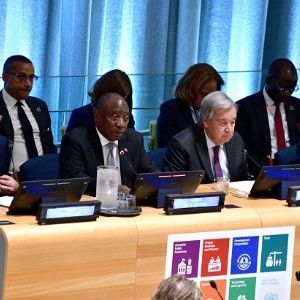
South African President Cyril Ramaphosa on the margins of the United Nations General Assembly (UNGA), speaking at the High-Level Dialogue on Financing for Development Summit, outlined the situation from the perspective of the countries of the Global South.
RELATED:
Climate Change, New Tech Regulation, US Sanctions -Boric at UNGA
On Wednesday, he named the following acute problems facing the world community: convergence of a climate crisis, recession, increased conflicts, environmental degradation, growing food insecurity, deepening poverty and unacceptable levels of hunger.
This is particularly relevant for countries in the Global South, and in particular the African continent. It was expected that the most vulnerable populations would receive the support they need.
“Agreed international commitments were not honoured. Principles such as common but differentiated responsibilities are not being respected,” Ramaphosa said, pointing out the deepening gap between developed countries and the Global South, which affects all aspects of life for people in developing countries.
“Sustainable and inclusive growth requires that more be done. We must strengthen and reform the international financial architecture. Developing economy countries must participate equally and meaningfully in the decision-making process of the international economic order,” the South African president pointed out.
“The mandates of multilateral development banks must be reframed to respond to the needs of developing economies. We must assert the principle of country ownership.”
He also called for the incorporation of objective data on the needs and capacities of both developed and developing countries into the workings of the international tax system.
��⤵️
(3/5)
Key Demands to #G20 –
Recognize need for accelerated & affordable access to transition finance to global south & commit to making IFIs & MDBs fit for purpose by supporting timely reform of international financial architecture.#G20Summit2023 #G20India pic.twitter.com/UMxOImVDeK— Climate Action Network South Asia (@CANSouthAsia)
September 6, 2023
“Multilateral development banks should support projects and programmes that are aligned to the development priorities and climate commitments of these countries,” Ramaphosa said.
“More innovation is required to enable the private sector to play a greater role in addressing the finance gap. This includes a new approach to blended finance with a focus on the developmental impact of investments.“
He also emphasised the critical importance of public finance for the development of countries and called for developed countries to meet their commitment to allocate at least 0.7 per cent of their gross national income to official development assistance. They also need to fulfil their commitment to mobilise US$100 billion a year to fight climate change.
#BRICSSummit | South African President Cyril Ramaphosa announced that the BRICS group has agreed to admit Argentina, Saudi Arabia, Egypt, Ethiopia, the United Arab Emirates, and Iran as full members of the bloc. pic.twitter.com/rcnh1rZX1S
— teleSUR English (@telesurenglish)
August 24, 2023



